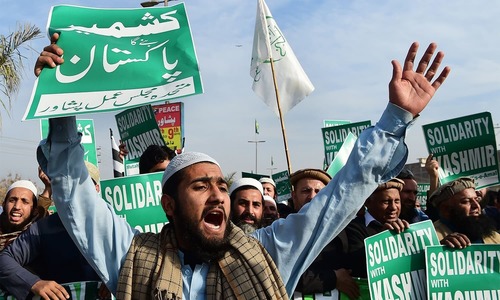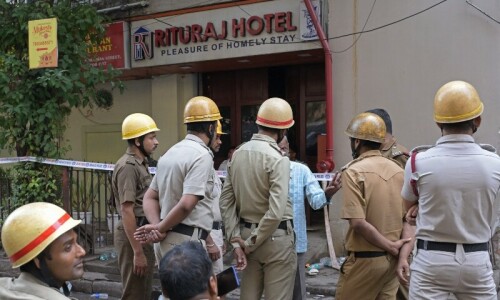A security clampdown and a strike sponsored by separatists fighting against Indian rule shut most of India-held Kashmir on Monday, a day after deadly protests and fierce fighting killed 16 combatants — 3 Indian soldiers and 13 suspected militants — and four civilians.
Armed police and paramilitary soldiers in riot gear fanned out across the region and are patrolling streets in anticipation of anti-India protests and clashes.

Authorities have also clamped a curfew in the old parts of Kashmir's main city of Srinagar, the urban centre of protests and clashes against Indian rule. According to Times of India, internet service has also been suspended in the area.
Pakistan on Sunday had condemned the brutal and indiscriminate use of force by the Indian forces.
Political leaders also condemned the violence, calling for action against India.
The foreign minister termed Sunday the "worst day of state terrorism in Kashmir valley".
"Movement that is rooted in heart and soul of a people and represent their innermost aspirations and a struggle for identity, cannot be crushed with the physical might," Punjab Chief Minister Shahbaz Sharif said. "New phase in the Kashmiris’ struggle for right to self-determination is inspired by legendary valour of Burhran Wani."
Pakistan Tehreek-i-Insaf Chairman Imran Khan also took to Twitter to condemn the violence and demanded the United Nations to act against India.
Meanwhile, Leader of the Opposition in Punjab Assembly Mian Mahmoodur Rasheed submitted a resolution condemning violence by Indian forces in the region.
Fierce clashes
Twenty people were killed in India-held Kashmir in some of the fiercest clashes this year in the region on Sunday.

Thirteen Kashmiris described by Indian authorities as militants and three Indian soldiers died in several clashes south of Srinagar.
Another four Kashmiris were killed and scores of others injured when police opened fire on thousands of demonstrators who poured onto the streets, throwing stones and chanting slogans against Indian occupation.
Troops had used tear gas and pellet guns to disperse the crowd, and later opened fire. Most of the injured sustained pellet wounds, but six had gunshot wounds, said S.P. Vaid, the director general of police in India-held Kashmir.
Local residents have put the number of injured at over 50.
Thousands of Kashmiris hit the streets, raising anti-India slogans and demanding an end to Indian rule over the region as troops launched “anti-militant” operations in three southern villages.
By the time authorities handed over the bodies of some of the suspected militants to their families, tens of thousands had gathered to attend their funerals while shouting slogans like “Go India, go back” and “We want freedom”.
Vaid said the army received information on Saturday night about suspected militants hiding in an area near Dragad village in Shopian district, about 50km south of Srinagar.
In Dragad, seven bodies of suspected militants were recovered, including ‘top commanders’. “They were killed in a gun battle,” Vaid said, adding that the owner of the house in which they were trapped was also killed.
While eight of the dead were identified as local cadres of the area’s largest militant group, Hizbul Mujahideen, troops were still clearing off the rubble of a destroyed house at a third gun battle site where bodies of three suspected militants lay, Vaid said.
The area residents said soldiers had blasted several civilian homes with explosives while fighting the suspected militants.
Another suspected militant was killed in Dialgam village in Anantnag district, while one was arrested, Vaid said.
Two Indian soldiers and one civilian were killed in another gun battle in Kachdoora village, where a battle with a separate group of four to five suspected militants was ongoing, Vaid had said.
Foreign Office spokesman Dr Faisal had said that "this mindless killing spree had exposed, yet again, the ugly, inhuman face of the state-terrorism that India had been perpetrating against the Kashmiris for decades".
India and Pakistan each administer parts of Kashmir, but both claim the territory in its entirety. Rebels have been fighting against Indian rule since 1989. They demand that Kashmir be united either under Pakistani rule or as an independent country.















































